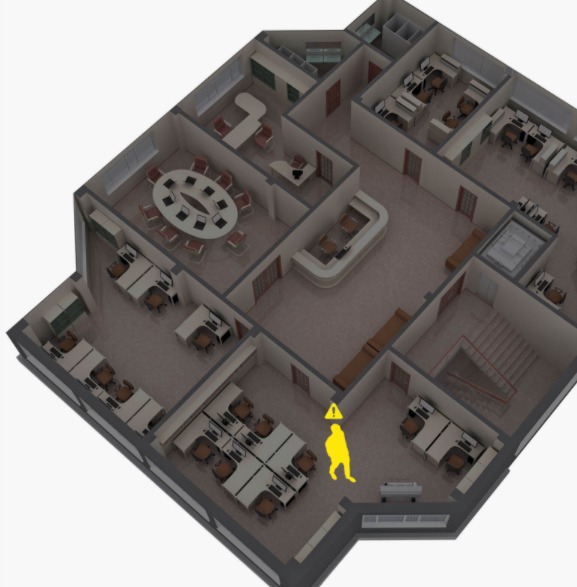Illustration of a person being detected by the Nexos system.
Provided by Igor
Months after debuting an intelligent disinfection solution to customers in the midst of a pandemic, West Des Moines-based smart buildings startup Igor has won the IoT World COVID-19 Innovation Award.
Within 45 days in early 2020, Igor developed its Nexos Intelligent Disinfection system, which uses UV-C disinfecting lighting controlled by Igor’s existing software platform Nexos. Through Nexos, building managers at health care facilities, offices, schools, data centers and other potential clients can direct the Intelligent Disinfection system to disinfect shared spaces — such as bathrooms or conference rooms — after the system detects people have left the room. Building managers can also schedule automated, daily disinfection to take place after hours at a facility.
Even before the pandemic, businesses lost billions of dollars a year in productivity due to the flu and other outbreaks of illness, said Igor founder and CTO Dwight Stewart.
“We could basically just connect up a few different things for this, such as UV-C light, and offer a turnkey solution that can be just dropped into a conference room or other shared spaces that are high in traffic,” Stewart said. “By solving those kinds of spaces … it really reduces the opportunity for spread of disease.”
Igor developed its own UV-C light fixture to incorporate the light into the existing Nexos platform. Using UV-C light doesn’t require replacing cartridges to refill the system, and makes it easy for customers to scale the system’s reach across facilities.“It’s very sustainable from an operational standpoint,” Stewart said. “UV-C has been in hospital settings for cleaning and disinfecting, so it’s not as though UV-C itself is new.”
The same reason UV-C light is harmful to viruses and pathogens makes it hazardous for humans directly exposed, and is invisible to the human eye — so Igor developed a way to schedule disinfection, and sensors to verify when rooms are empty — through monitoring door closures, people-counting sensors, and other means.
“It can give you the equivalent of a sunburn,” Stewart said. “In a university setting, we’ve all studied a long time and might fall asleep in the library study room. So you can’t rely just on motion sensors, you’ve got to have something like a people-counting sensor that’s going to actually detect any person in the room, regardless of movement.”
Stewart didn’t say how many customers installed the Nexos Intelligent Disinfection system over the summer, but the company is building on manufacturing capacity for the UV-C lighting component. Igor’s ability to develop the disinfection system quickly benefited from the overall Nexos model, which can be installed quickly by building management, he added.
“We have the equivalent of a bunch of Lego pieces that we can kit as different configurations with different solutions. Now that we have enough of those different kinds of Lego pieces, we can create new kits for solving different problems quickly,” he said. “That’s one of our main benefits in general — it’s really easy to augment buildings with this technology.”
Despite this year’s sudden trend toward remote work, Igor’s products target businesses and organizations that will continue to value a shared facility for people, he said.
“Our customer base is interested in buildings doing more than just [being] a shelter,” Stewart said. “If people can do all their work on a computer, then there’s not a lot of reason to get back together. … You might want to create spaces that are safe for a multitude of reasons. The work environment can be a safe environment, or school can be a safe environment for children. There’s a lot of value in creating these spaces that produce value beyond shelter.”
